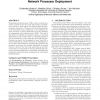Free Online Productivity Tools
i2Speak
i2Symbol
i2OCR
iTex2Img
iWeb2Print
iWeb2Shot
i2Type
iPdf2Split
iPdf2Merge
i2Bopomofo
i2Arabic
i2Style
i2Image
i2PDF
iLatex2Rtf
Sci2ools
155
click to vote
CASES
2003
ACM
2003
ACM
Programming challenges in network processor deployment
Programming multi-processor ASIPs, such as network processors, remains an art due to the wide variety of architectures and due to little support for exploring different implementation alternatives. We present a study that implements an IP forwarding router application on two different network processors to better understand the main challenges in programming such multi-processor ASIPs. The goal of this study is to identify the elements central to a successful deployment of such systems based on a detailed profiling of the two architectures. Our results show that inefficient partitioning can impact the throughput by more than 30%; a better arbitration of resources increases the throughput by at least 10%, and localization of computation related to the memories can increase the available bandwidth on internal buses by a factor of two. The main observation of our study is that there is a critical lack of tools and methods that support an integrated approach to partitioning, scheduling...
Related Content
| Added | 05 Jul 2010 |
| Updated | 05 Jul 2010 |
| Type | Conference |
| Year | 2003 |
| Where | CASES |
| Authors | Chidamber Kulkarni, Matthias Gries, Christian Sauer, Kurt Keutzer |
Comments (0)

